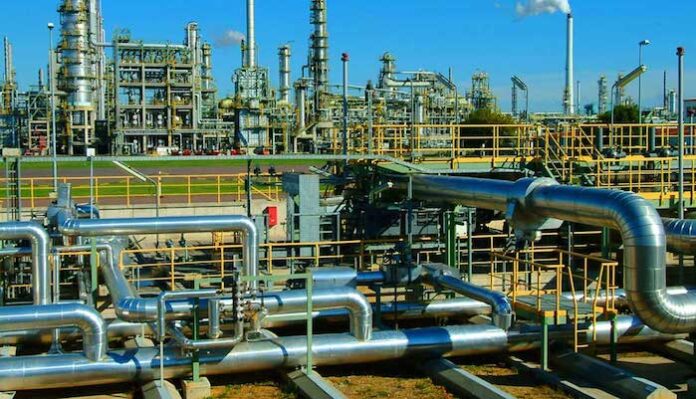Abuja plans refineries in oil states in the Niger Delta
By Jeph Ajobaju, Chief Copy Editor
Abuja is planning to establish 18 modular refineries in the Niger Delta, three each in the six major oil producing states of Rivers, Bayelsa, Akwa Ibom, Delta, Edo, and Cross River.
How that will play out efficiently on the ground remains to be seen, however. The four federal refineries – one each in Kaduna and Warri, and two in Port Harcourt – have not functioned for years, yet consume billions of naira yearly in maintenance.
A modular refinery is a simplified refinery requiring significantly less capital investment than traditional full-scale refinery facilities.
The initial process, or Crude Distillation Unit (CDU), allows for simple distillation of crude oil into low octane naphtha, diesel, kerosene and residual fuel oil, according to vfuels.com
Environment Minister of State Sharon Ikeazor said the aim is to stop illegal refining in oil areas and its impact on lives and livelihoods.
“In a bid to find alternative sources of livelihood for artisanal refiners and to encourage them to disengage completely from their illegal activities, the Federal Ministry of Environment in collaboration with the Office of the Senior Special Adviser to the President on Niger Delta Affairs and other critical stakeholders, are working on the establishment of three modular refineries per state in the oil producing areas as a pilot scheme to engage them (artisanal refiners),” she said.
__________________________________________________________________
Related articles:
Nigeria spends $26.5 billion on refinery TAM that can build three new ones
Nigeria’s four refineries lose N104.3b in one year
Dangote Refinery, raising workforce to 57K, nears a spot in Africa’s top 5 entities
__________________________________________________________________
Refineries to be built with local content
“These modular refineries are intended to be 100 per cent designed and manufactured in Nigeria using the expertise of government institutions such as the Ministry of Petroleum Resources, Federal University of Petroleum Effurun and Ahmadu Bello University Zaria,” Ikeazor explained in a statement.
“Others include Ministry of Niger Delta Affairs, Niger Delta Development Commission, Petroleum Technology Development Fund, Nigerian Content Development and Management Board, National Agency for Science and Engineering Infrastructure, etc.”
Abuja will also train artisanal refiners on environmental management, including skills for oil spill management and remediation, she added, reported by The PUNCH.
“The main objective is to enable those participating in illegal/artisanal oil refining to transit into operation of modular refineries to be run legitimately as a business under proper technical, commercial and environmental regulation.
“It is also the intention of government that other artisanal refiners that cannot be absorbed in the pilot modular refineries will be congregated into business clusters and the Alternative Livelihood Fund in the Hydrocarbon Pollution Remediation Project be utilised to set up businesses for them, especially on the management on spent oil to engage them.
“These measures will help to drastically reduce the menace of artisanal refining, oil theft and pipeline vandalism to the benefit of our environment and bring prosperity to the oil host communities in the Niger Delta and to our nation at large.”
Illegal oil activities degrade the environment
Ikeazor said artisanal refining, oil theft, and pipeline vandalism are largely responsible for the degradation of the environment, especially in the Niger Delta.
“The much talked about Port Harcourt soot is caused by the activities of artisanal refineries due to the indiscriminate ‘cooking’ of stolen crude oil which releases very thick black smoke into the atmosphere, and later settles on surfaces as soot.”
To address this issue, she stressed, the National Oil Spill and Response Agency annually embarks on sensitisation campaigns in host communities.
The campaigns are done through the agency’s disaster risk reduction programme that focuses on the socio-economic implications of artisanal refining, oil theft, and pipeline vandalism.
“The ministry has sought the support and collaboration of the Minister of Defence and the Minister of State for Petroleum Resources in tackling the menace.”





